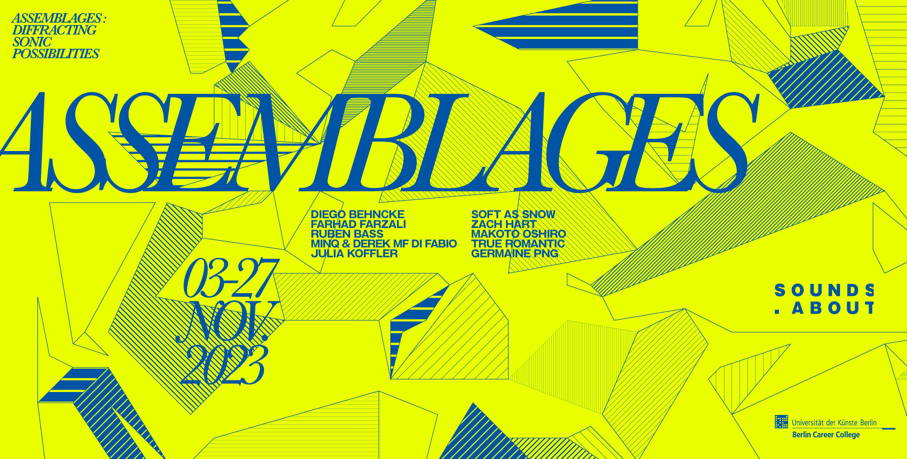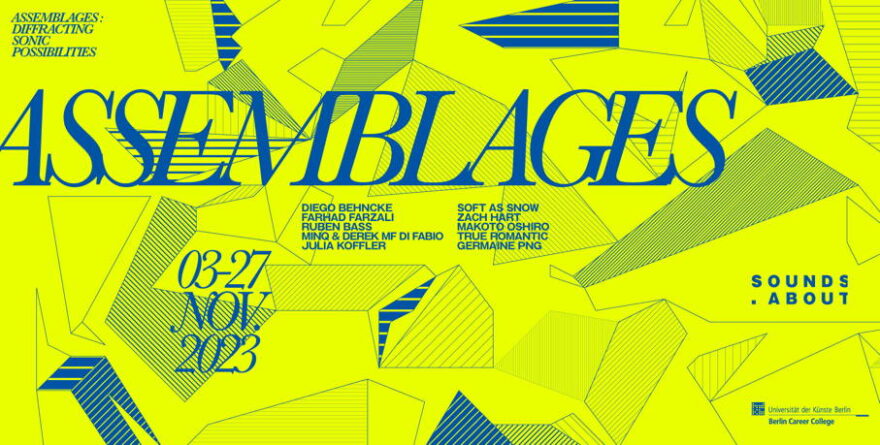ASSEMBLAGES:
Diffracting sonic possibilities

03.11. – 27.11.2023
english below
ASSEMBLAGES: Diffracting sonic possibilities
Im Geiste der Beantwortung von Fragen, die noch nicht gestellt wurden, präsentiert SoundsAbout im November zeitbasierte Arbeiten, die auf mehreren zeitlichen Ebenen funktionieren. Durch die Verschmelzung, Hinterfragung und Neuerfindung von Formaten wie Performances, Vorträgen, Workshops oder Hörsitzungen nimmt eine unbestimmte Landkarte Gestalt an, die eine spekulative Kartografie in expandierende Richtungen präsentiert.1977 behauptete Jacques Attali, dass Musik eine kommende Gesellschaft ankündigt und Vorbote für die politische, wirtschaftliche und kulturelle Ordnung der nachfolgenden Generationen ist. Er schien die politische Ökonomie der verschiedenen Epochen auf der Grundlage der strukturellen Beziehungen zwischen Musik und Lärm richtig vorherzusagen. Mit dieser Methode stellte er die Industrialisierung der Musik als Ware im 20. Jahrhundert in Frage, die er als „Vorratshaltung von Zeit“ bezeichnete, ein Umstand, der unter anderem zu einer sich wiederholenden und entmündigenden Art des Denkens über mögliche Zukünfte außerhalb der normativen Produktionsweisen führte. Die Konzeptualisierung von Zeit als Ware führt zu einer allgemeinen Desillusionierung in Bezug auf realisierbare Alternativen. Wir scheinen uns ständig zu fragen: „Was kommt als nächstes?“. Die Produktion und die darauffolgende Kritik scheinen panisch ständig nach einem Ausweg im nächsten Objekt der Neuerung zu suchen, das diese Stagnation der Bedeutung durchbrechen könnte.Die Ausstellung untersucht dagegen, was es bedeutet, sich inmitten von Prekarität und Unvorhersehbarkeit zu positionieren. Ist es möglich, die Unbestimmtheit als Bedingung unserer Zeit zu akzeptieren, anstatt die Welt durch die Binarität von Fortschritt und Verfall zu sehen? Anna Tsing charakterisiert in ihrem Buch The Mushroom at the End of the World Assemblagen als Versammlungen mit offenem Ende, deren emergente Effekte von Begegnungen das Leben möglich machen. Im Gegensatz zum einheitlichen Takt, zu dem der Fortschritt marschiert, sind Assemblagen das unbeabsichtigte Zusammenspiel mehrerer zeitlicher Rhythmen und Bahnen. Indem wir den Begriff der polyphonen Assemblagen übernehmen, fragen wir nach gemeinschaftlichen Wirkungen, ohne sie vorauszusetzen, und spekulieren darüber, wie wir die Fragen, die uns über die Zukunft nachdenken lassen, neu formulieren können.
ASSEMBLAGES: Diffracting sonic possibilities
In the spirit of posing answers for questions not yet asked, in November Soundsabout showcases time-based works that function on multiple temporal scales. By merging, questioning, and reinventing formats like performances, lectures, workshops, or listening sessions, an indeterminate map takes form, presenting a speculative cartography in expanding directions.
In 1977, Jacques Attali claimed that music announces a society to come, heralding the political, economic, and cultural order of succeeding generations. He seemed to rightfully predict the political economy of different epochs based on the structural relations between music and noise. Through this method, he problematized the industrialization of music as a commodity in the 20th century, in what he called “the stockpiling of time”, a circumstance which led -among other things- to a repetitive and incapacitating way of thinking about possible futures outside of the normative modes of production. The conceptualization of time as a commodity gives rise to a generalized disillusion concerning viable alternatives. We seem to find ourselves constantly asking, “What comes next?”. Production and its subsequent critique appear to be in a constant panic, trying to look for an exit in the next object of novelty that could break this stagnation of meaning.
The exhibition explores, in contrast, what it means to position ourselves amid precarity and unpredictability. Instead of seeing the world through the binary of progress and decay, is it possible to accept indeterminacy as the condition of our time? Anna Tsing, in her book The Mushroom at the End of the World, characterizes assemblages as open-ended gatherings whose emergent effects of encounters make life happen. Compared to the unified beat that progress marches to, assemblages are the unintentional interplay of multiple temporal rhythms and trajectories. By adopting the term polyphonic assemblages, we inquire about communal effects without assuming them and speculate on reframing how we pose the questions that make us think about the future.
* SoundsAbout is a collaboration between the Master’s program Sound Studies and Sonic Arts at the University Berlin and the gallery Zwitschermaschine, offering a project space to present and discuss, question and celebrate the work and ideas of our students and their guests for three months every year.
